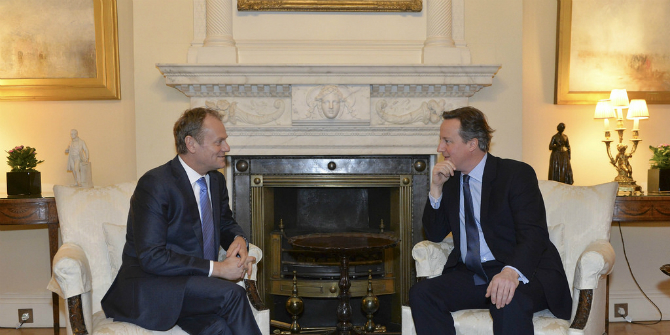 If the UK were to break up then how might a post-UK England relate to the rest of the British Isles, Europe, and the wider world? Will the end of the UK produce a reduced and angry ‘Little England’ or might continuity prevail and the world find itself dealing with a ‘Little Britain’? Tim Oliver considers some of the issues that may one day help answer the question of ‘who speaks for England?’.
If the UK were to break up then how might a post-UK England relate to the rest of the British Isles, Europe, and the wider world? Will the end of the UK produce a reduced and angry ‘Little England’ or might continuity prevail and the world find itself dealing with a ‘Little Britain’? Tim Oliver considers some of the issues that may one day help answer the question of ‘who speaks for England?’.
Arguments about the survival of the United Kingdom of Great Britain and Northern Ireland have reached new heights thanks to Scotland’s independence referendum (and the possibility of a second one), Brexit, growing English nationalism, a London torn between being a capital city and a global city, a Northern Ireland peace process that remains fragile, and now a looming 2017 general election. While the death of the UK is far from guaranteed – indeed it may confound its sceptics – debates nevertheless continue, ranging from the economic viability of an independent Scotland through to the need for an English Parliament.
These debates, however, often overlook one of the most important issues: how a post-UK England might behave as a country in the world. Granted, debates about how the UK might break up and the associated difficulties for all in managing this are at the forefront of people’s minds. This is especially so given any breakup and emergence of a post-UK England will not happen overnight. It may be that England and Wales, in particular, remain bound together for some time becoming known, as Matthias Matthijs has pointed out, as the ‘Former United Kingdom of England and Wales’ (or FUKEW for short).
However the UK breaks up and however long this might take, what becomes of an independent Scotland, of the Northern Ireland peace process should it lead to a united Ireland, the future of Wales, or the broader politics, economics, and security of the British Isles and therefore a large chunk of Western Europe will depend in large part on the attitude of the 85% of the UK that is England.
Will Scotland, the rest of Europe and others find themselves facing an England that sinks into being an isolated power, humiliated by the end of the UK, defined by some of the more inward looking ideas of UK politics, and derided as ‘Little England’? Or might England as – to all intents and purposes – the successor state of the UK not only inherit its formal claims and most of its capabilities, but also some of its more internationally minded outlooks and aspirations to play a global role? In such a world, will we see not a ‘Little England’ but a ‘Little Britain’?
Image credit: Pixel2013, Pixabay/PublicDomain.
There are four issues to begin examining this topic. First, what will the process of England emerging as a power look like and how might this shape England’s foreign policy? To many outside the UK – and much to the annoyance of many within it – the UK, Britain, and England are often assumed to be the same. The slow (re)emergence of England as a clearly defined political unit and identity will be an indeterminate process, and one not without angst for the English or the rest of Britain. Uncertainty about what is British and what is English will define the process of any breakup of the UK. Even in Scotland, Wales, and Northern Ireland the influence of Britain-turned-England will remain a deeply rooted one, much like the EU will retain some influence over the UK post-Brexit. England’s (re)emergence as an independent state is unlikely to be one that is fought for, celebrated or maybe even declared with much fanfare.
Second, what will England inherit and what do the experiences of other ‘successor states’ point to? We can divide the legacies into material, constitutional, and ideational. Materially – and calculated from a crude 85% claim – England’s GDP would remain in the world’s top ten, and could lay claim to the vast majority of Britain’s military capabilities. A potential loss would be the UK’s nuclear weapons, currently based in Scotland and for which there exists no immediately viable alternative location in England. Whether nuclear status would boost England’s (like the UK’s) claim to being a great power is debatable, but much ink will be spilt by English commentators and decision makers over what the loss or reduction in nuclear power status means.
England could claim – or find itself landed with – the right of successor state in many international organisations. A sticking point will be whether England can claim the UK’s permanent seat on the United Nations Security Council. Retaining the seat would almost certainly depend on unwillingness by the other permanent members to countenance reform of the council’s setup. The status of successor state could also bring with it responsibility for the UK’s remaining overseas territories. It could also bring with it many of the legacies of empire, racism and exploitation, but also of commerce, exploration, science and culture along with a host of other political ideas and aspirations.
Third, what England would inherit constitutionally and in terms of ideas would help answer our third question: how might the end of the UK change England as a country, society and political system? Despite devolution to Scotland, Wales, Northern Ireland and – to a much lesser extent – Greater London, England retains many of the characteristics of a majoritarian form of government and politics, better known as the Westminster model. Unless this structure changes, English foreign policy will be based on a domestic political model characterised by a centralised London-based one of winner takes all as opposed to some consensus and federal system where power is more dispersed.
This will shape the politics – whether dominated by the Conservative party as some fear – and thus political outlooks and aspirations England defines as its own, but many of which could be inherited from the UK. The key question here will be whether the end of the UK will lead England to adopt a more reduced or transformed views of its place in the world. Will it change political outlooks such as ideas of England, like the UK before it, ‘punching above its weight’ or even lead to a reversal of Brexit? A comparison many might look to is that of Russia as the successor to the USSR, but this comparison has limits. The collapse of the USSR was quick, led to a chaotic period of transition that was traumatic for many, and coincided with the collapse of an ideological system. The end of the UK is likely to be gradual and form part of a longer-running relative decline of the UK. Once again, for England there may be no critical juncture that challenges established ideas and systems.
Finally, what will England’s behaviour and foreign policy mean for the rest of the British Isles, Europe, and international relations more broadly? Given the previous discussion we might assume that nothing much will change. For the USA, NATO allies, and other powers around the world, cuts in UK – this time through the division of UK military assets that leave a reduced English defence capability – will fit their longer experiences of dealing with Britain’s relative decline.
The UK-US ‘special relationship’ is at its core special in the three areas of nuclear weapons, intelligence sharing, and special forces. The end of the first need not undermine the other two, assuming English decision makers continue their British predecessors desires to remain close to the USA for the two reasons they have done so since 1945: to enhance the UK’s international standing, and to maintain a US commitment to European security and a European balance of power that the UK (and England) alone cannot shape.
The one area of Europe whose politics England will continue to shape will be the British Isles, something the Irish, Welsh, and Scots have wrestled with for much of the past thousand years. Debates about a Scottish foreign policy or the standing of England in the world can forget that for both – along with Ireland and Wales – their most important (special?) relationships will be with the countries that share the British Isles. Managing English power (and for England, using that power in a cooperative way) will require forums such as a revamped British-Irish Council. Membership of – or some form of close relationship – with the EU would be pursued by Scotland, Ireland or Wales in part to secure leverage over England and to ensure they do not live in its shadow.
The end of the UK and the (re)emergence of England as a separate state are far from guaranteed or likely to happen quickly. Should it happen then a host of questions and issues surrounding what an English foreign policy might look like will inevitably work their way into political debates. They will be addressed as English policy makers and public become more aware of England’s politics, identity, responsibilities, place in the world and power. But we should be weary of assuming that any such break-up is likely to lead to a humbled, chastened and sulking England desperate to isolate itself from the world. It could be that as the successor state England could inherit some of the UK’s more global ambitions.
This article first appeared on the BPP blog and it gives the views of the author, and not the position of LSE Brexit, nor of the London School of Economics.
Tim Oliver is a teaching fellow in British politics at UCL. From 2015-17 he was a Dahrendorf Fellow for Europe-North American Relations at LSE IDEAS. He remains an Associate of LSE IDEAS.







